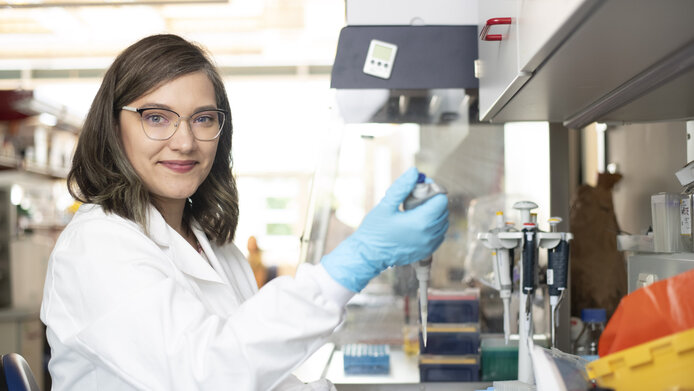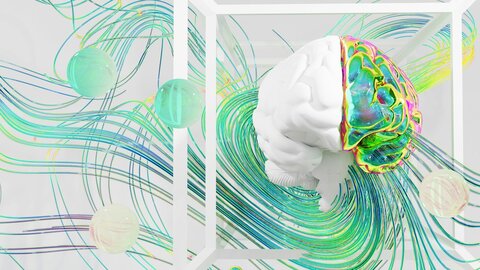How a mutation becomes cancer

Ms. Kameneva, why are you particularly interested in the initial phase after mutation?
Polina Kameneva: We still know very little about the events that cause a healthy cell to develop into a first cancer cell. Until now, the processes that take place immediately after a cancer-associated mutation are hidden and we can only identify them after the fact, when the tumor has already developed. The situation is particularly difficult with childhood cancers, because they can develop while a fetus is still in the womb. My aim is to investigate the mechanisms and principles behind the development of cancer in children. I focus on neuroblastoma, the most common solid, localized tumor outside the skull area in children. With this knowledge, we can then research therapies that can be used to prevent the development of cancer.
What hypothesis is your project based on?
Kameneva: Childhood cancers are closely linked to the development of the organism. During this time, stem cells develop into functional body cells. Mutations that lead to cancer can occur at any stage of this process. My research is based on the hypothesis that the probability of developing cancer varies even with identical mutations and depends on the developmental stage of the cell. We know that some cells don’t become cancer cells in spite of mutations. In my project, I want to find out at which stages of development cells are susceptible or protected, and why.
Personal details
Polina Kameneva began her scientific career in marine biology before devoting herself to researching the development of cancer in the neurosciences. After a three-year research stay at the Karolinska Institutet in Sweden, she moved to the Center for Brain Research at the Medical University of Vienna in 2021. Kameneva has headed a research group at St. Anna Children's Cancer Research Institute since June 2024.
What steps do you want to take to answer this research question?
Kameneva: The idea of the project is to trigger mutations in an experimental setting and in a controlled manner and to track cell development over the following days. To do this, my team and I will develop 3D organoids, structures made from human stem cells that mimic the development of an organ. We will recreate the fetal peripheral nervous system and the adrenal glands, where the cancer cells of neuroblastoma can also develop. In our models, we can specifically introduce neuroblastoma-associated mutations to see which genetic regulatory mechanisms the cells react with. This research approach will allow us to identify those cells that deviate from the normal developmental pathway and develop into the first cancer cells.
What will the START Award mean for your research activities?
Kameneva: The START Award is a real game changer in my situation. This is mainly due to the fact that the methods we use, like 3D organoids and single cell sequencing, are very expensive. We need them to understand the human aspects of carcinogenesis because they provide an unprecedented amount of detailed information. The START grant will give me the opportunity to work with these technologies and the confidence to carry out my experiments in a comprehensive and controlled manner. The START Award will also allow me to give more young people the chance to pursue a degree in biomedical research. I’m convinced that we need many bright minds to take on the challenging task of basic research in the field of pediatric cancer.
About the project
The project “Modeling Pediatric Tumor Initiation with Human Stem Cells” investigates the development of neuroblastomas, a type of tumor that occurs primarily in early childhood. With her research, Polina Kameneva wants to gain new insights into cancer and identify protective factors in the early stages of cancer development. To this end, she will be using state-of-the-art technologies to analyze the formation of tumors in 3D organoids created from human stem cells.
What motivates you in your day-to-day research?
Kameneva: As researchers, we push the boundaries of the unknown every day. We are discovering new mechanisms of how our organism develops and comes to life at the cellular level. For me personally, it's an incredible feeling when I manage to discover something new. The discussions within the team, the opportunity to learn from others’ ideas, and the experience of coming up with new ideas together are also particularly motivating. This is all the more meaningful when you know that the research you do can have a real impact on children's lives.
What role models have inspired you?
Kameneva: I have always been fortunate to have the support of other researchers, who have helped me grow as a scientist. Tatiana Orlova, Andrew Imbs, and Gennady Kamenev helped me during my doctoral studies. I am forever grateful to Igor Adameyko, who was a very caring and inspiring mentor during my postdoctoral training. In my new position as group leader at St. Anna Children's Cancer Research Institute, Kaan Boztug will be helping me set up my own research group. I am also a fellow of the mentoring program “Pathway to Independence,” a non-profit publishing organization for biology researchers, and I am lucky to be mentored there by Liz Robertson. I believe that I owe a large part of my success to these mentors, and I hope that in turn, I can be a mentor to the next generation of researchers myself.
The FWF START Award
The START program of the Austrian Science Fund (FWF) is aimed at outstanding young researchers, giving them the opportunity to plan their research in the long term and with a high degree of financial security. It is endowed with up to €1.2 million and is one of Austria’s most prestigious and most highly endowed awards alongside the FWF Wittgenstein Award.





